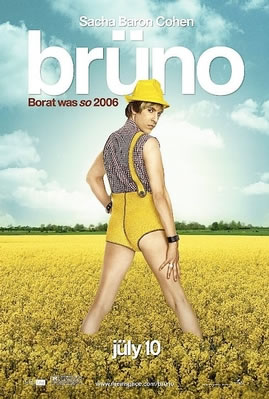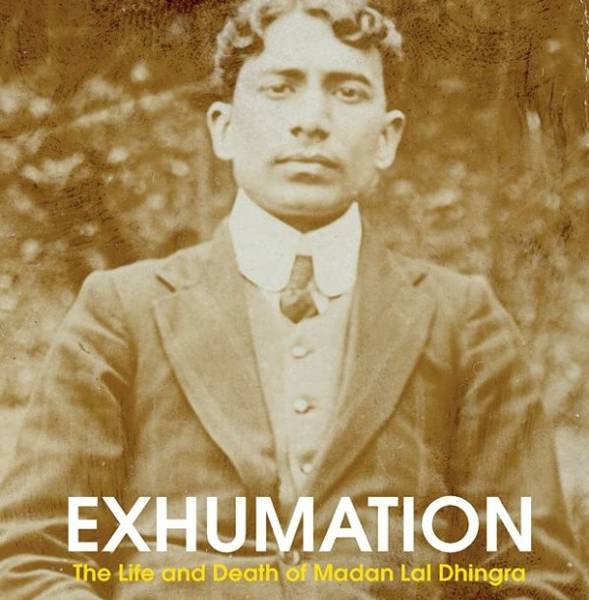 It is difficult, having watched Brüno, to support the claims made by many that the film is racist and homophobic. It is a funny and, at times, hilarious film. It is also a film that is in many ways flawed. But it is not offensive in the simplest sense of the word. Brüno's problem is its structure, which makes it a difficult film to appreciate in any meaningful way. It is made up of over a dozen vignettes, many of which - Brüno's attempt to seduce Ron Paul, and his short stint at a military base - are comic genius. Others, such as the film's finale, and Brüno's visit to a swingers' party, are less funny. The loose thread that attempts to link all of these sections is Brüno's desire to become famous, a much vaguer goal than that of 2006's Borat, in which the title character's aim was to seduce Pamela Anderson.
It is difficult, having watched Brüno, to support the claims made by many that the film is racist and homophobic. It is a funny and, at times, hilarious film. It is also a film that is in many ways flawed. But it is not offensive in the simplest sense of the word. Brüno's problem is its structure, which makes it a difficult film to appreciate in any meaningful way. It is made up of over a dozen vignettes, many of which - Brüno's attempt to seduce Ron Paul, and his short stint at a military base - are comic genius. Others, such as the film's finale, and Brüno's visit to a swingers' party, are less funny. The loose thread that attempts to link all of these sections is Brüno's desire to become famous, a much vaguer goal than that of 2006's Borat, in which the title character's aim was to seduce Pamela Anderson.
Director Larry Charles and Screenwriter Sacha Baron Cohen try to toe as close to this line as possible, but ultimately, they are forced to include too many expository scenes, that are clearly staged, in order to set up the relevance of the funnier, improvised scenes. This leads to a sense of doubt that plagues and, ultimately, does disservice to the film from around the second scene, clouding the whole film with an air of doubt. But what of those scenes of comic gold? From Brüno's appearance on a southern talk show (also likely staged), to his potentially poignant attempts to become straight, the vacuous nature of celebrity culture emerges as as much of a target as the small-mindedness of middle America. However, the film's aforementioned finale, in which Elton John, Sting and (shudder) Bono accompany Brüno in a singalong is brilliantly effective in rendering futile the rest of the film's lampooning of the rich and famous.
Thus, the viewer is left with the "hilarious" nature of some rednecks' reaction to Brüno's homosexuality as the film's main source of liberally (in both senses of the word) shocking comedy. However, this is ground covered in, among other places, Baron Cohen's Borat, so why he feels the need to aggravate the hornet's nest again here is unclear. This also seems to be a favourite hunting ground of Larry Charles, as witnessed in Religulous, earlier in the year, and the obsession of these two films with baiting reactionary Christians is slowly beginning to emerge perhaps not as a replacement for comic flair, but certainly a distraction from the fact that neither Charles nor Baron Cohen are particularly talented filmmakers. They are men who understand, and obviously appreciate the language of cinema, but ultimately they are only able to lampoon it; Brüno contains countless scenes of faux-high drama that poke fun at the film's lack of real, genuine emotion. But by doing so, the filmmakers are only highlighting the fact that Brüno has nothing at its soul. It is as hollow as the culture that it pertains to satirise.
However, it would be churlish to deny that I laughed during Brüno. A lot. It is for the most part brilliantly, and brutally, funny. And where it is not funny, it is due to the jokes falling a little flat, and feeling a little stale, rather than being because of any hint of homophobia or racism. The persona of Brüno is perhaps a little less ostentatious than Borat's, and as such, will most likely generate fewer catchphrases, fewer t-shirts. This is not a bad thing, but it's a shame that this character, who shows greater potential than his predecessors, and is easily as funny, is doomed to be trapped within what is, essentially a broken film.

